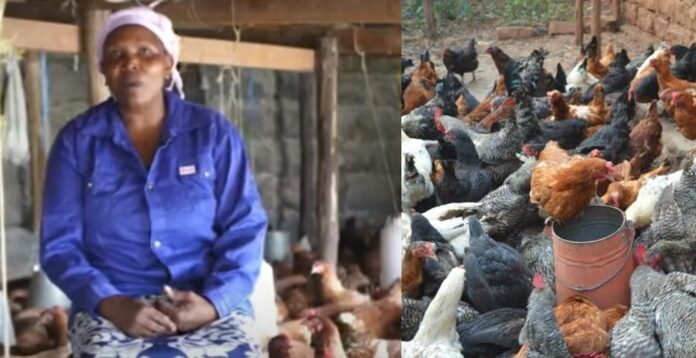Starting a business is never easy, and it takes a lot of effort, hard work, and determination to succeed. For Pauline Osoro, a resident of Nakuru, Ngata area, this was a lesson she learned the hard way.
When she started her poultry business, she had no idea what she was doing, and as a result, her first attempt ended in failure. However, this did not discourage her, and she persisted until she achieved success.
Pauline’s journey began with 50 kienyeji chickens, which all died due to her lack of knowledge on how to take care of them. She didn’t know that chickens require vaccines and drugs to keep them healthy.
Instead of giving up, she persevered and added a rooster to one of the remaining hens and continued with them.
”Despite the loss of my initial batch of chickens, I persevered and decided to add one cock to the remaining hen and continued rearing them. My husband supported me by adding more chickens, and I continued with kienyeji chicken,” she recalled.
Eventually, Pauline and her husband decided to switch to hybrid layers, and they bought 150 chickens.
‘At that point, I was raising local (kienyeji) chickens and my husband suggested that we add hybrid layers to our flock. As a result, we purchased 150 layers and increased our overall number of chickens.” She added.
However, they faced another challenge when the chickens died due to the cold.
‘Shortly after purchasing the chickens, we were unaware of how to properly provide them with heat, but we proceeded to construct and secure their coop to prevent any cold air from penetrating. Unfortunately, all the chickens died once again,” she claimed
Nevertheless, Pauline did not give up, and she bought 200 more chickens and a charcoal jiko to keep them warm.
Although they lost 80 chickens, they managed to raise 70 until they matured.
Pauline faced yet another challenge when she couldn’t find a market for her X-layers.
‘I enlisted the help of a young man to find customers for my layers, and he succeeded in bringing some buyers, but I did not make a profit because he requested a commission for each sale.”
Despite selling the layers at no profit, she persevered and bought 300 more chickens, and this time, everything went smoothly. She gained more customers and learned how to vaccinate and keep her hens warm. When the chickens got old, Pauline’s husband bought her more chicks, and she continued to expand her flock until she had 1300 chickens.
She has gained many customers and has learned how to transport her eggs to them to maintain her customer base.
Despite her success, Pauline still faces challenges. One of her main challenges is maintaining a consistent egg supply when she has many customers but fewer eggs. To mitigate this, she has a car that she uses to transport eggs to her customers’ places of stay.
How to start Kienyeji chicken farming for eggs or chicks production
Another challenge is the fluctuating prices of feed and eggs. When the price of feed is high and the price of eggs is low, it can be challenging to make a profit. Additionally, eggs from Uganda are sold at a low price, which can drive down the price of locally produced eggs.
To tackle these challenges, Pauline uses Unga feeds. However, when she first started, she didn’t know much about the different types of feeds, and she could incur losses. She now urges the government to help farmers like her by providing loans to increase the number of hens and hence the number of eggs.









